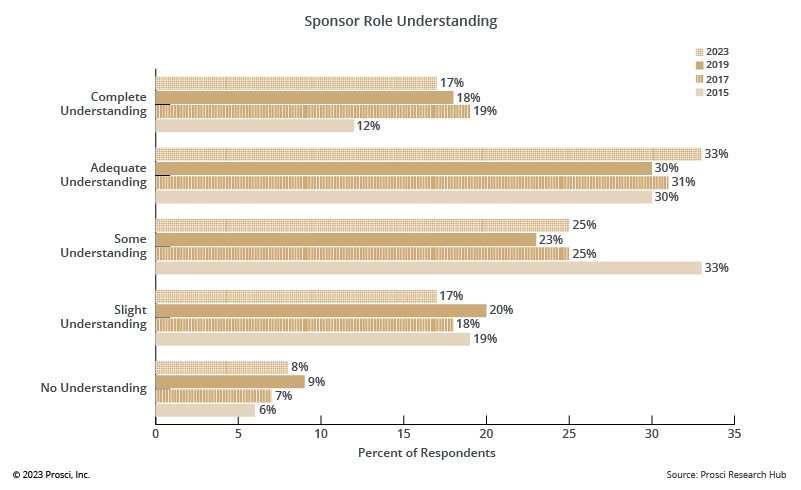Primary Sponsor's Role and Importance

4 Mins
Updated: January 22, 2026
Published: April 15, 2021

Executives and senior leaders play an essential role as primary sponsors of change. They give the change credibility, authorize funding and resources, and perform important employee-facing activities. People in the organization look to these individuals at the top to demonstrate why the change is necessary and perform other critical activities as only they can.
Primary Sponsor's Role in Change
A primary sponsor is the leader who authorizes the change within an organization and is ultimately responsible for ensuring that the change realizes intended benefits. The level of sponsorship required depends on the risk level of the change. A high-risk initiative requires a senior executive or officer of the organization as a primary sponsor. A lower-risk initiative might require a senior or mid-level manager.
Depending on the change's scope and complexity, a primary sponsor they may enlist other sponsors to help proliferate and advance the people side of change throughout specific areas of the organization as needed. Such a sponsor can be any business leader, executive or mid-level manager whose involvement is necessary to ensure the desired outcomes from the change.
Instead of taking the lead during change, the primary sponsor and other sponsors execute their unique roles as part of a coordinated effort with the change practitioner, project manager and people managers. The change practitioner is like the director of a play, leading the change management strategy from behind the scenes and enabling others to perform their employee-facing roles on the change stage.
Prosci Core Roles in Change Management

Enabling sponsors involves preparing, equipping and supporting the appropriate leader to fulfill their critical responsibilities—what Prosci refers to as the ABCs of Sponsorship. A primary sponsor who has been well-equipped can clearly articulate the role in plain language:
"I, the primary sponsor for this change, contribute to successful change outcomes
(through adoption and usage) by Actively and visibly participating throughout the project, Building coalitions of sponsorship, and Communicating support and promoting the change."
The ABCs of Sponsorship
Prosci's ABCs of Sponsorship emerged from more than two decades of Best Practices in Change Management research in which participants identified the most critical roles of executive sponsors during times of change. The ABCs of effective sponsorship are:
A) Active and visible participation throughout the project
The role of active and visible participation for the primary sponsor was cited in the research more frequently than any other sponsor activity. Study participants identified a list of activities that constituted active and visible sponsorship—from championing the change and allocating the necessary funding to participating in change activities and supporting the team.
Sponsors cannot disappear once they've attended the kickoff meeting for a project. Their sustained presence is necessary to build and maintain momentum for a change.
B) Build a coalition of sponsorship
Participants expressed the need for the primary sponsor to take the lead in building and maintaining a strong group of sponsors—or sponsor coalition—to help support the change. The primary sponsor must mobilize other key business leaders and stakeholders, so they can advocate for the change and legitimize it in their part of the organization. A healthy coalition of sponsors is especially important for changes that stretch across multiple functions within the organization.
C) Communicate, support and promote the change to impacted groups
People impacted by change want to hear why a change is important from a leader at the very top of their organization. Senior leaders are the preferred senders of messages about the business reasons for change, as well as the risks or costs of not changing. An effective primary sponsor legitimizes the need for change within the organization and sets the prioritization of change through direct engagement with impacted employees.
Prosci Research on Sponsor Effectiveness
Although the ABCs of Sponsorship are critical to the success of any change effort, in reality, many executives and senior leaders are not fulfilling these roles effectively.
The figures below reveal how participants reported their sponsors' effectiveness in the three roles discussed above. The role sponsors struggled with most is building a coalition of sponsors.
Sponsor Participated Actively and Visibly

Sponsor Communicated Directly With Employees

Sponsor Built a Coalition of Sponsorship

Importance of Sponsors During Change
Prosci research demonstrates that sponsors are so critical to change efforts that they can make or break a project or initiative. Understanding this research can help practitioners clearly communicate this importance to leaders, as well as what it takes to be successful and how to avoid costly mistakes.
When it comes to change, primary sponsors and sponsors are:
A top contributor to success
When asked to identify key contributors to the success of their change initiatives, participants in the Best Practices in Change Management – 12th Edition research study placed active and visible sponsorship at the top of the list. Sponsorship has been number one on the list of top contributors in all of Prosci’s benchmarking reports since 1998. Although much has changed in the discipline of change management over the last two decades, the importance of the primary sponsor's role in change has remained constant.
The biggest obstacle to success
When asked to identify the biggest obstacle to success, participants in the same study identified a lack of executive support and active sponsorship as their primary obstacle to success. Ineffective primary sponsors did not understand their role in change, the resources required, or the purpose of the change. They were inactive or invisible, not at the right level, did not align with other leaders around the change, and wavered in their support. Ineffective sponsorship resulted in more resistance and slower progress toward realizing the organization’s desired results.
A key influence on starting early
Senior leadership involvement and previous experience with change management are top contributors to starting change management early on projects. And Prosci research shows that starting change management activities early in a project’s lifecycle has a significant positive impact on outcomes.
Preferred senders of change communications
Employees have preferred senders of messages about change. Employees want to hear about the change from two people in the organization: the person they report to and a leader at the top.
In addition to having significant impact on the success of change initiatives at a macro level, primary sponsors play a specific key role in supporting change management application and communicating directly to employees about why a change is needed.
Often uninformed about their role
Research participants said their executives and senior leaders were generally willing to be sponsors of change, yet many did not fully understand what that meant. The figure below shows how well leaders understood their role and responsibilities as change sponsors. Half of the participants in our most recent study reported that their sponsors had less than an adequate understanding of the sponsor role.

Critical to projects meeting objectives
Prosci's research consistently shows that sponsor effectiveness is critical to project success. Participants in the latest research reported that sponsor effectiveness had a direct impact on whether the project met objectives. In fact, those projects with an extremely effective sponsor met or exceeded objectives more than twice as often (and nearly three times as often) as those with a very ineffective sponsor.
Correlation of Sponsor Effectiveness With Meeting or Exceeding Objectives

Change Practitioners as Enabling Partners
Sponsors have a critical role to play in change, but information alone will not make them successful. To help sponsors fulfill the ABCs of Sponsorship, change management practitioners must play an enabling role. This includes clarifying the sponsor role, sharing supporting research and data, offering coaching and encouragement, and helping with tactical responsibilities to set up the sponsor for success. By facilitating specific sponsorship activities and action steps, change practitioners become vital partners in driving successful change outcomes.




